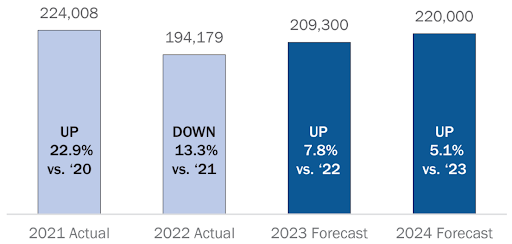In the ever-evolving landscape of the Colorado automotive market, the Colorado Auto Outlook presents a promising forecast for the next two years. This article delves into the key trends driving an anticipated increase in new vehicle sales, balanced by the factors that may temper this growth, offering a comprehensive view for members of the Colorado Automobile Dealers Association and beyond. Drawing on data from Experian Automotive, this analysis is a must-read for anyone interested in the future dynamics of Colorado’s auto industry.
Key Trends in the Colorado Market
- Forecast summary: pent-up demand will provide momentum for the new vehicle market over the next 15 months, while the negative factors will place a ceiling on how high sales can go.
- State new retail light-vehicle registrations are predicted to increase 7.8% this year and 5.1% in 2024.
- Registrations approached 56,000 units in the Third Quarter of this year and increased 17.3% versus depressed year-earlier levels.
- Battery electric vehicles accounted for 11.2% of the market in the first nine months of this year, up from 7.8% last year. BEV share increased from the Second to the Third Quarter of 2023.
- Rivian, Buick, Land Rover, Tesla, and Mazda had the largest percentage increases so far this year.
Key Factors Boosting New Vehicle Sales
Pent-up demand is growing.
New vehicle registrations since the onset of the pandemic have been well below average. Although sales recovered from the low point of the recession in 2009, it took several years for the market to rebound. The pent-up demand that accrued between 2009 and 2015 had barely been released before the pandemic and ensuing supply chain issues boosted the total again. Pent-up demand will support new vehicle sales for several years.
Employment and household incomes are strong.
Recession is still a possibility and affordability has weakened, but the unemployment rate is low and wage growth is steady.
Monthly Unemployment Rates in Colorado
AUGUST 2022
2.6%
JULY 2023
2.9%
AUGUST 2023
3.1%
Impressive array of new products.
Today’s new vehicles offer significant improvements compared to the average 10-year-old car. Aside from the fact that their current vehicle may be wearing out, advances in safety features, performance, alternative powertrains, and infotainment are all factors luring shoppers into dealerships.
Key Factors Holding Back New Vehicle Sales
Interest rates are high.
The prime interest rate has increased by more than five points during the past three years, placing significant upward pressure on vehicle loan and lease payments.
Vehicle prices are high.
Average transaction prices moved higher last year due to supply chain issues, inflationary pressures, and higher vehicle content. Escalating prices and higher rates have weakened vehicle affordability, which will be an issue holding back sales.
Soft landing not guaranteed.
Most economists expect growth to remain positive despite higher interest rates, but this is not a sure thing. The economy is essentially at break-even right now, and it won’t take much to push it to recession.
Other threats.
After being put on hold since the pandemic hit in March of 2020, student loan payments are restarting, gas prices are high, excess household savings have been depleted, and if the UAW strike lingers, sales could be impacted.
Forecast for State New Retail Light Vehicle Registrations

The graph above shows annual new retail light vehicle registrations in 2021 and 2022 and Auto Outlook’s projections for 2023 and 2024. Historical data sourced from Experian Automotive.
Market Summary

Domestics consist of vehicles sold by GM, Ford, Stellantis (excluding Alfa Romeo and FIAT), Tesla, Rivian, and Lucid. Data sourced from Experian Automotive.
About The Colorado Auto Dealers Association (CADA)
The Colorado Automobile Dealers Association (CADA) was established in 1933 by a group of dealers to challenge a federal excise tax, leading to its incorporation in 1938. As a trade association, CADA actively advocates on behalf of the auto industry, particularly Colorado auto dealers, and the state’s driving public, tackling a range of legislative and regulatory complexities.
We keep dealers informed through publications, Above the Fold, the Bulletin (see archives), and LinkedIn updates. Additionally, CADA focuses on education, helping dealers stay compliant and informed about new legislation impacting the industry, especially after the legislative term concludes each May.
Stay in the Loop: Sign Up for Our Weekly Newsletter
Stay up-to-date with our recent developments, updates, and shifts in our communication approach by subscribing to our email newsletter. Receive all the vital information directly in your inbox and be at the forefront of our upcoming endeavors.
Information sourced from Colorado Auto Outlook, published by Auto Outlook, Inc. on behalf of the Colorado Automobile Dealers Association. Data sourced from Experian Automotive.
